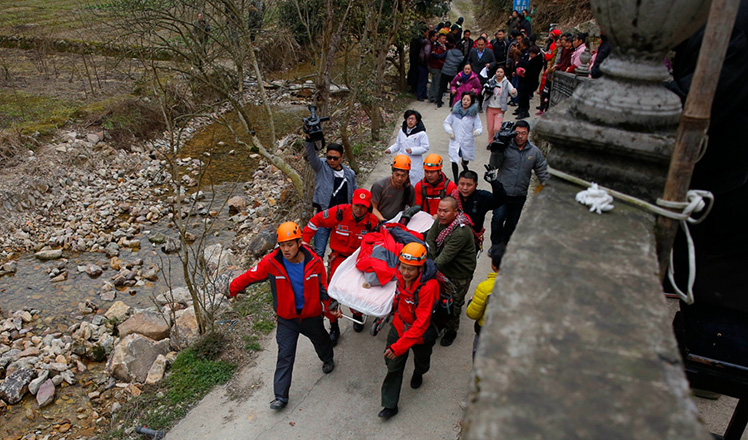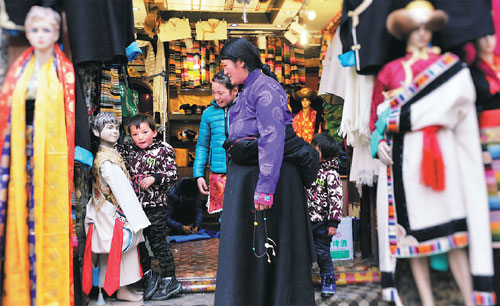Grassland provides inspiration
Updated: 2016-02-22 08:09
By Palden Nyima and Da Qiong in Lhasa(China Daily)
|
||||||||
|
A Tibetan clothes shop along Barkor Street attracts customers in Lhasa, the Tibet autonomous region. Zhang Rufeng / Xinhua |
Entrepreneur's yak dairy creates jobs for nomads, allowing them to stay on the land
Lhasa entrepreneur Dondrup Tsering, born to a nomadic family and captivated by the grasslands, has a distinctive dual motive: earning a profit while preserving Tibetan culture.
His vision, in which the nomads of Maqu county in Gansu province earn enough to maintain their traditional lives among their pastures and livestock, started with a robe shop and then expanded to include a yak dairy.
"Fast-growing urbanization means many nomads no longer continue their traditional nomadic lives on the grassland. Instead, they come to the cities to live," Dondrup said. "Their living conditions changed with the migration, and many parts of Tibetan culture are vanishing in this way."
Keeping young people on the grassland will help to preserve the singular traditional Tibetan culture, including nomadic singing, storytelling, weaving, horse racing and yak racing, he said.
"I want to help them to stay on the grassland, and the key to that is to make it possible for them to make good money on the grassland," he said.
Launching a business
This is no old man's fantasy. Dondrup is just 30. He had been working as an editor at the Tibet People's Publishing House for more than three years when he quit his job to pursue his dream.
He first opened a Tibetan clothes shop in Lhasa, the capital of the Tibet autonomous region. Competition is daunting, both in both design and pricing, Dondrup said, forcing continual innovation and lower costs.
Competitors "will either copy or create similar products, or lower the price for the same products, so creativity is always needed", he said. "I've had many failures with businesses, but I have never given up, because I want to live for my dream."
Born in Maqu county in the Gannan Tibetan autonomous prefecture in Gansu province, an area famous for its wildflower-carpeted grasslands, flocks of sheep and herds of horses, Dondrup exemplifies the changing prospects for Tibet's youth.
With rapid economic development and social progress, more young people are leaving the nomadic lifestyle to move to the cities for employment, business ventures and other opportunities.
"Most local young people choose to find government jobs, such as government workers or teachers. Meanwhile, some people, especially young people from outside, like to do business in Lhasa," said Zhang Lina, a postgraduate student at the College of Economics and Management of Tibet University.
"The number of young Tibetans engaging in business is rising as there is relatively less competition compared with other Chinese provinces, and Tibet is in the process of rapid development."
The Tibet government is also encouraging young people to create businesses by making it cheaper and easier to get started, such as reducing requirements for registered capital, the amount investors must have to start a company.
"In the past, the registered capital for a small or medium enterprise was at least 10 million yuan ($1.56 million). Last year, the government reduced the registration to zero," Zhang said.
Influenced by his parents, who have long operated a Tibetan robe business in Maqu, Dondrup started his first business in 2005, while still a college student studying Tibetan literature at Northwest University for Nationalities.
"There is an annual horse racing festival on the grassland in my hometown. I sold horse-related products during my summer vacations a decade ago," he said.
- Missing children found safe in nearby village
- Rich Chinese splurge on sportswear as luxury's lustre dims
- Urgent remedy sought for pediatrician shortage
- China starts safety check for school buses as new semester draws near
- Ticket scalpers face crackdown at Beijing hospitals
- Judicial DNA test in hot demand after policy change
- Classic Car Show kicks off in London
- Balkan, Austria police agree to register refugees on Macedonian border
- Turkey blames Kurdish militants for Ankara bomb; vows reprisals
- Britain scrambles fighters to intercept Russian bombers
- Chinese community to protest against Peter Liang's verdict
- Car bomb attack on military in Turkish capital kills 28

 Chinese photographers' work shines in major photo contest
Chinese photographers' work shines in major photo contest
 88th Academy Awards Governors Ball Press Preview
88th Academy Awards Governors Ball Press Preview
 Egg carving master challenges Guinness World Record
Egg carving master challenges Guinness World Record
 Missing children found safe in nearby village
Missing children found safe in nearby village
 Madonna's world tour lands in Hong Kong
Madonna's world tour lands in Hong Kong
 Producing high-speed rail tracks
Producing high-speed rail tracks 
 Surreal world created by Canadian photographer
Surreal world created by Canadian photographer
 Lanterns light up the night across China
Lanterns light up the night across China
Most Viewed
Editor's Picks

|

|

|

|

|

|
Today's Top News
Investigation for Nicolas's campaign
Will US-ASEAN meeting be good for region?
Accentuate the positive in Sino-US relations
Dangerous games on peninsula will have no winner
National Art Museum showing 400 puppets in new exhibition
Finest Chinese porcelains expected to fetch over $28 million
Monkey portraits by Chinese ink painting masters
Beijing's movie fans in for new experience
US Weekly

|

|









